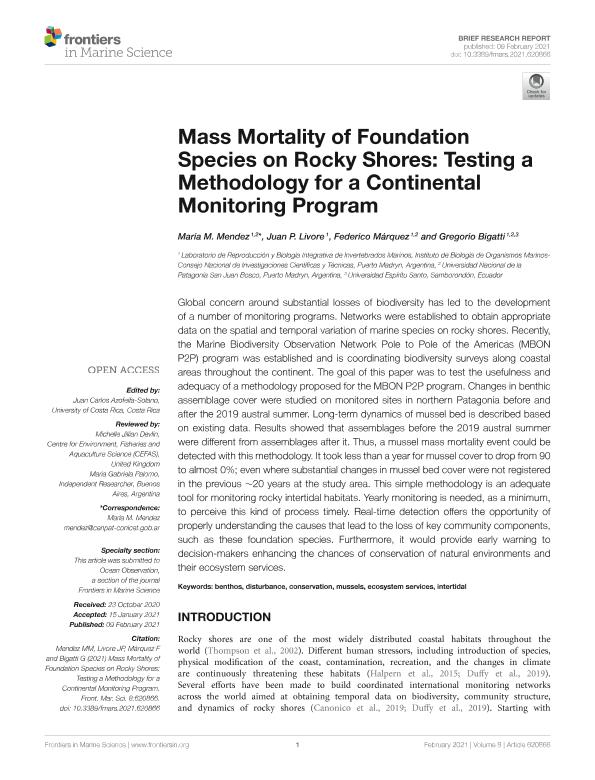Artículo
Mass Mortality of Foundation Species on Rocky Shores: Testing a Methodology for a Continental Monitoring Program
Fecha de publicación:
02/2021
Editorial:
Frontiers Media S. A.
Revista:
Frontiers In Marine Science
e-ISSN:
2296-7745
Idioma:
Inglés
Tipo de recurso:
Artículo publicado
Clasificación temática:
Resumen
Global concern around substantial losses of biodiversity has led to the development of a number of monitoring programs. Networks were established to obtain appropriate data on the spatial and temporal variation of marine species on rocky shores. Recently, the Marine Biodiversity Observation Network Pole to Pole of the Americas (MBONP2P) program was established and is coordinating biodiversity surveys along coastal areas throughout the continent. The goal of this paper was to test the usefulness and adequacy of a methodology proposed for the MBON P2P program. Changes in benthic assemblage cover were studied on monitored sites in northern Patagonia before and after the 2019 austral summer. Long-term dynamics of mussel bed is described based on existing data. Results showed that assemblages before the 2019 austral summer were different from assemblages after it. Thus, a mussel mass mortality event could be detected with this methodology. It took less than a year for mussel cover to drop from 90 to almost 0%; even where substantial changes in mussel bed cover were not registered in the previous ∼20 years at the study area. This simple methodology is an adequate tool for monitoring rocky intertidal habitats. Yearly monitoring is needed, as a minimum, to perceive this kind of process timely. Real-time detection offers the opportunity of properly understanding the causes that lead to the loss of key community components, such as these foundation species. Furthermore, it would provide early warning to decision-makers enhancing the chances of conservation of natural environments and their ecosystem services.
Palabras clave:
BENTHOS
,
DISTURBANCE
,
CONSERVATION
,
MUSSELS
,
ECOSYSTEM SERVICES
,
INTERTIDAL
Archivos asociados
Licencia
Identificadores
Colecciones
Articulos(IBIOMAR)
Articulos de INSTITUTO DE BIOLOGIA DE ORGANISMOS MARINOS
Articulos de INSTITUTO DE BIOLOGIA DE ORGANISMOS MARINOS
Citación
Mendez, María Martha; Livore, Juan Pablo; Marquez, Federico; Bigatti, Gregorio; Mass Mortality of Foundation Species on Rocky Shores: Testing a Methodology for a Continental Monitoring Program; Frontiers Media S. A.; Frontiers In Marine Science; 8; 2-2021; 1-7
Compartir
Altmétricas




